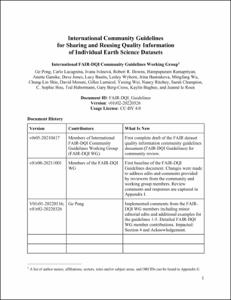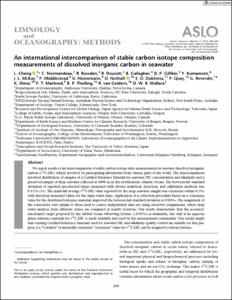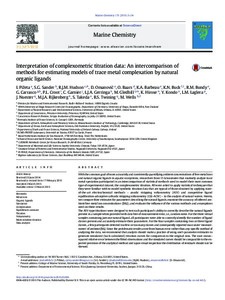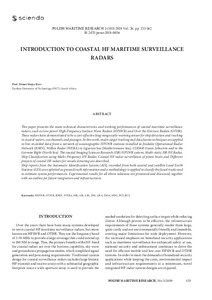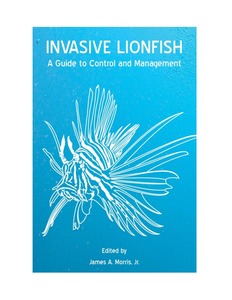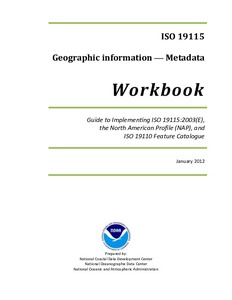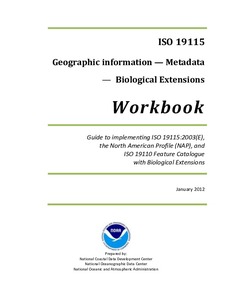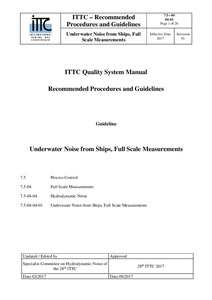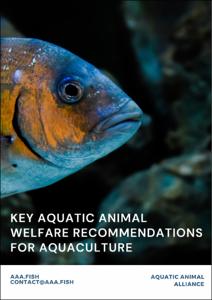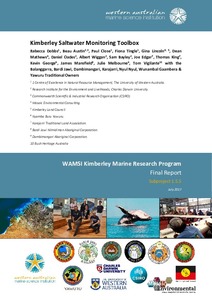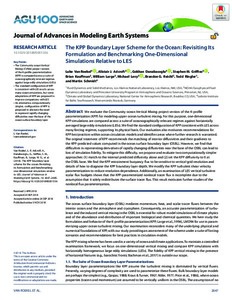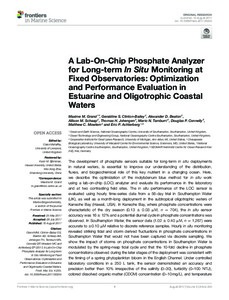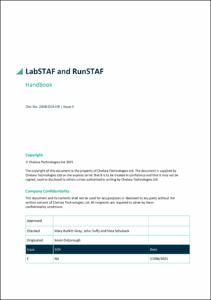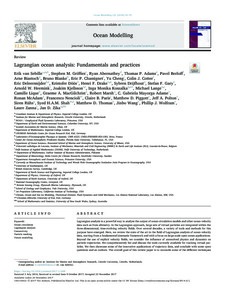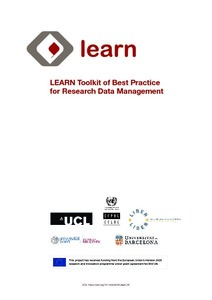Browsing Miscellaneous Community Practices by Title
Now showing items 258-277 of 541
-
International Community Guidelines for Sharing and Reusing Quality Information of Individual Earth Science Datasets. Version v01r02-20220326.
(OSF Preprints for Earth Science Information Partners (ESIP), Severna Park. MD, 2022)Under the auspices of the Earth Science Information Partners (ESIP) and with collaboration among members of the ESIP Information Quality Cluster (IQC), the Barcelona Supercomputing Center (BSC) Evaluation and Quality Control ... -
An international intercomparison of stable carbon isotope composition measurements of dissolved inorganic carbon in seawater.
(2019)We report results of an intercomparison of stable carbon isotope ratio measurements in seawater dissolved inorganic carbon (δ13C-DIC) which involved 16 participating laboratories from various parts of the world. The ... -
International Union of Geological Sciences Manual of Standard Methods for Establishing the Global Geochemical Reference Network.
(International Union of Geological Sciences Commission on Global Geochemical Baselines, Athens, Greece, 2022)“Everything in and on the Earth - mineral, animal and vegetable - is made from one, or generally some combination of, the natural chemical elements occurring in the rocks of the Earth’s crust and the surficial materials ... -
Interoperability between metadata standards: a reference implementation for metadata catalogues.
(Informatie Vlaanderen, Belgium, 2016)To enable the public and private sector to discover, adopt and reuse government information, administrations publish their data on data portals. The data is accompanied by structural metadata, providing information about ... -
Interpretation of complexometric titration data: an intercomparison of methods for estimating models of trace metal complexation by natural organic ligands.
(2015)With the common goal of more accurately and consistently quantifying ambient concentrationsof free metal ions and natural organic ligands in aquatic ecosystems, researchers from 15 laboratories that routinely analyze ... -
Introduction to coastal HF maritime surveillance radars.
(2019)This paper presents the main technical characteristics and working performances of coastal maritime surveillance radars, such as low-power High-Frequency Surface Wave Radars (HFSWR) and Over the Horizon Radars (OTHR). These ... -
Invasive Lionfish: a Guide to Control and Management.
(Gulf and Caribbean Fisheries Institute, Marathon, FA, 2012)The countries of the Wider Caribbean with their vibrant coral reefs are major tourist destinations, bringing billions of dollars to the Caribbean annually. The importance of reef resources is invaluable to local economies ... -
ISO 19115 Geographic information — Metadata Workbook: Guide to Implementing ISO 19115:2003(E), the North American Profile (NAP), and ISO 19110 Feature Catalogue.
(NOAA National Coastal Data Development Center, Silver Spring, MD, 2012)This workbook is not intended to replace the ISO standards but is meant to act as an educational and implementational guide to be used in conjunction with ISO 19115 Geographic information ─ Metadata ISO 19115:2003(E). -
ISO 19115 Geographic information — Metadata — Biological Extensions Workbook: Guide to implementing ISO 19115:2003(E), the North American Profile (NAP), and ISO 19110 Feature Catalogue with Biological Extensions.
(NOAA National Coastal Data Development Center, Silver Spring, MD, 2012)This workbook is not intended to replace the ISO standards but is meant to act as an educational and implementational guide to be used in conjunction with ISO 19115 Geographic information ─ Metadata ISO 19115:2003(E). -
ITTC Quality System Manual. Recommended Procedures and Guidelines. Guideline: Underwater noise from ships, full scale measurements. Revision 01.
(International Towing Tank Conference, Zurich, Switzerland, 2017)The purpose of this document is to provide guidance on the available procedures and methodologies for measuring underwater noise from surface ships. For the purposes of this document underwater noise is meant the sound ... -
IWC photo-identification catalogues: draft guidelines.
(International Whaling Commission, Impington, UK, 2017)The International Whaling Commission (IWC) has a history of using data and analyses from photo-identification catalogues to assist with its work. (Within this document the term ‘photo-ID catalogue’ describes a database ... -
The JANUS Underwater Communications Standard.
(IEEE, 2014)There are currently no digital underwater communications standards. In this paper we describe JANUS, a simple multiple-access acoustic protocol designed and tested by the NATO Centre for Maritime Research and ... -
Joint FORCE11 & COPE Research Data Publishing Ethics Working Group Recommendations for the handling of ethical concerns relating to the publication of research data. Version 1.
(Joint FORCE11 & COPE Research Data Publishing Ethics Working Group, 2021)The scope of the Working Group is to develop recommendations for how data repositories, journal publishers, and institutions can handle ethical cases relating to the publication of research data, and steps to take if an ... -
Key Aquatic Animal Welfare Recommendations for Aquaculture.
(Aquatic Animal Alliance, New York, NY, 2020)This document is intended to provide an overview of what the Aquatic Animal Alliance, having consulted with experts globally, has identified as key areas where welfare intervention is most needed for animals used in ... -
Kimberley Saltwater Monitoring Toolbox. WAMSI Kimberley Marine Research Program Final Report Subproject 1.5.5.
(Western Australian Marine Science Institution, Perth, 2017)The Kimberley Indigenous Saltwater Science Project (KISSP) was a collaboration funded by the Western Australian Marine Science Institute (WAMSI) as part of their Kimberley Marine Research Program (KMRP). The KISSP was ... -
The KPP Boundary Layer Scheme for the Ocean: revisiting its formulation and benchmarking one-dimensional simulations relative to LES.
(2018)We evaluate the Community ocean Vertical Mixing project version of the K-profile parameterization (KPP) for modeling upper ocean turbulent mixing. For this purpose, one-dimensional KPP simulations are compared across a ... -
A Lab-On-Chip Phosphate Analyzer for Long-term In Situ Monitoring at Fixed Observatories: Optimization and Performance Evaluation in Estuarine and Oligotrophic Coastal Waters,
(2017)The development of phosphate sensors suitable for long-term in situ deployments in natural waters, is essential to improve our understanding of the distribution, fluxes, and biogeochemical role of this key nutrient in a ... -
LabSTAF and RunSTAF Handbook 2408-014-HB Issue F.
(Chelsea Technologies Ltd., West Molesey, UK, 2022)This introductory section provides a brief overview of the development of LabSTAF and RunSTAF and future aims for the development of Single Turnover Active Fluorometry (STAF). It also includes a description of the major ... -
Lagrangian ocean analysis: fundamentals and practices.
(2018)Lagrangian analysis is a powerful way to analyse the output of ocean circulation models and other ocean velocity data such as from altimetry. In the Lagrangian approach, large sets of virtual particles are integrated within ... -
LEARN Toolkit of Best Practice for Research Data Management.
(LEARN : LEaders Activating Research Networks Project, London, UK, 2017)Research data is the new currency of the digital age. From sonnets to statistics, and genes to geodata, the amount of material being created and stored is growing exponentially. However, the LERU Roadmap for Research ...
 Repository of community practices in Ocean Research, Applications and Data/Information Management
Repository of community practices in Ocean Research, Applications and Data/Information Management
